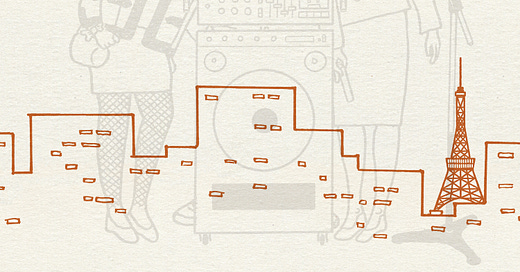5 Japanese Reggae-Pop Records We Couldn’t License for Tokyo Riddim, and the Wild Stories Behind Them
Lost tapes, plane crashes, and music industry mysteries behind Japan’s hidden reggae-pop tracks.
When I started working on Tokyo Riddim, I didn’t expect it to become Time Capsule’s best-selling release. At first, it was just a personal obsession. I kept stumbling across Japanese records from the late ‘70s to mid-‘80s where, out of nowhere, a reggae groove would appear. A lot of times, it was one track hidden on a City Pop LP. Other times it was whole albums trying to capture a sound from Jamaica or the UK.
The music on Tokyo Riddim sits in-between space. It’s not pure roots reggae. It’s a hybrid — reggae grooves filtered through J-pop gloss, new wave angles, and the sentimental vibes of kayōkyoku idols. It’s music that feels both familiar and alien.
While digging for tracks, I found way more gems than I could fit onto the compilation. Some of them didn’t make it because of licensing nightmares, lost paperwork, or negotiations that went nowhere.
Every reissue released on Time Capsule is done by negotiating directly with the original rights holders and securing a proper license. Essentially, we’re borrowing the rights to use the recording for a set period of time. Sometimes the other party is a major label like Universal; other times, it’s an indie artist who pressed just 500 copies of a record in the ‘80s and hasn’t thought about it since. Each case comes with different conditions, and often, local industry rules or cultural factors place further restrictions on how the music can be used. And in projects like the Nippon Series, where a single compilation involves multiple rights holders, the process can become extremely complicated.
Anyway, I wanted to share a glimpse of five tracks I tried hard to license but couldn’t. These tracks still deserve to be heard, and I think anyone into this music would be curious why they’re not on the album. Here’s a teaser:
● Tomoko Kuwae – “Canoe Boy”
We tried to license it first but couldn’t make it work, so we ended up covering it instead.
● Kyoko Takami – “Yume ni Anata”
A missing document somewhere in a label’s office killed the deal.
● Sandii & The Sunsetz – “Jamaican Night”
A plane crash, lost tapes, and a phone call with Makoto Kubota.
● Marlene – “Zanzibar Night”
Denied for reasons no one would explain. Still costs only about £2 in Tokyo record shops.
● Wonder City Orchestra – “Changing”
Joe Hisaishi, long before Studio Ghibli, channeling Stevie Wonder in reggae mode.
The full stories behind these tracks are wild, sometimes frustrating, and always full of unexpected details about how music travels — and how complicated this business can be.
If you’re curious to dig deeper — or you just love hearing how deals fall apart behind the scenes — consider subscribing. It helps keep Time Capsule digging for the next hidden record. You can listen to the tracks while you read the stories behind each one. 👇
There’s a 15% discount code for this month below too.
Keep reading with a 7-day free trial
Subscribe to Time Capsule to keep reading this post and get 7 days of free access to the full post archives.




